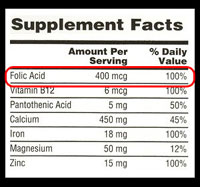Pregnancy
Get Enough Folic Acid

The Basics
Overview
It's important for everyone who can get pregnant or is planning to get pregnant to take a daily supplement with 400 to 800 micrograms (mcg) of folic acid. Taking a folic acid supplement in addition to following a healthy eating routine can help prevent serious health problems for babies.
Why is folic acid important?
Folic acid is a type of folate added to supplements and foods. Folate is a vitamin that’s especially important if you’re pregnant or may become pregnant. It can help prevent serious problems with your baby’s brain and spine.
Getting enough folic acid is important even when you aren’t planning to get pregnant. It’s most important to take folic acid at least 1 month before you get pregnant and through the first 3 months of pregnancy.
Talk to your doctor about folic acid.
Vitamins and Supplements
How can I get enough folic acid?
You can take a multivitamin that includes folic acid or a supplement that has only folic acid. You can find multivitamins and folic acid supplements at most pharmacies and grocery stores. Get tips for choosing a multivitamin with folic acid.
Be sure to check the label and choose a multivitamin or supplement with 400 to 800 mcg of folic acid. This label shows a multivitamin with 400 mcg folic acid.
Take Action
Vitamin and Supplement Tips
Make it easy to remember.
- Take your folic acid at the same time every day — for example, take it when you brush your teeth in the morning or when you eat breakfast
- Leave the bottle somewhere you’ll notice it every day, like on the kitchen counter — but be sure to keep it out of reach of young children
What about cost?
Under the Affordable Care Act, health insurance plans must cover folic acid supplements for women who may become pregnant. Depending on your insurance plan, you may be able to get folic acid supplements at no cost to you. Check with your insurance company to find out more.
If you don't have insurance, you may still be able to get help paying for folic acid supplements:
- Get connected with free or low-cost services in your state by calling 1-800-311-BABY (1-800-311-2229)
- Find a health center near you and ask about folic acid supplements
To learn more, check out these resources:
- Free preventive care for women covered by the Affordable Care Act
- How the Affordable Care Act protects you
- Understanding your health insurance and how to use it [PDF - 698 KB]
Learn more about health insurance options for pregnant women.
Eat Healthy
In addition to taking a folic acid supplement, it’s important to follow a healthy eating routine. Learn how to build a healthy eating routine [PDF – 1.6 MB].
Make sure to include foods with folate in your eating routine. Many healthy foods have folate, including:
- Spinach and other leafy greens
- Asparagus
- Oranges and orange juice
- Beans and peas
Folic acid is also added to foods like many cereals, breads, pastas, and other foods made with grains. Check the Nutrition Facts label and choose foods with folic acid.
Use these resources to:
Content last updated September 7, 2023
Reviewer Information
This information on folic acid was adapted from materials from the Centers for Disease Control and Prevention, the Office of Dietary Supplements, and the Office on Women’s Health.
Reviewed by:
Kara Beckman, PhD
ORISE Nutrition Policy Fellow
Office of Disease Prevention and Health Promotion
Dana DeSilva
ORISE Nutrition Policy Fellow
Office of Disease Prevention and Health Promotion
Dennis Anderson-Villaluz, MBA, RD, LDN, FAND
Lieutenant Commander, U.S. Public Health Service
Nutrition Advisor, Division of Prevention Science
Office of Disease Prevention and Health Promotion



